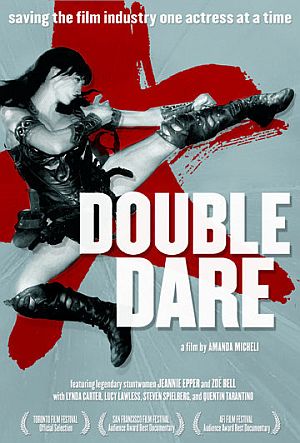★★
“Despite the poster, more WiP than GwG.”
 Misaki (Hoshino) is in prison for stabbing a policeman to death, but is taken from her jail to a remote island. There, she joins the rest of the hand-picked prisoners, who are there to be trained by a mysterious government organization, and moulded into operatives who can be used to protect national security. Most of the inmates just want to make things easy, sleeping with the guards in exchange for privileges, but Misaki is made of tougher stuff, and won’t buckle down to the authorities. While she begins plotting how to escape the island, she needs to overcome a number of problems, not least having no idea about where it is, and whether the small boat they stumble across will be capable of getting them to any other land.
Misaki (Hoshino) is in prison for stabbing a policeman to death, but is taken from her jail to a remote island. There, she joins the rest of the hand-picked prisoners, who are there to be trained by a mysterious government organization, and moulded into operatives who can be used to protect national security. Most of the inmates just want to make things easy, sleeping with the guards in exchange for privileges, but Misaki is made of tougher stuff, and won’t buckle down to the authorities. While she begins plotting how to escape the island, she needs to overcome a number of problems, not least having no idea about where it is, and whether the small boat they stumble across will be capable of getting them to any other land.
There’s definitely elements of Nikita here, not least the sequence where Misaki tries to take the facility head hostage. Except that, where that breezed through the training inside 25 minutes, it is, more or less, the entire focus of proceedings here. Hoshino snarls nicely as an independent and feisty bad girl, yet neither she nor any of the other residents are in the slightest bit convincing. I’d normally avoid using a phrase like “runs like a girl” as unnecessarily demeaning… except here, where it’s entirely accurate. I can see absolutely no chance – zero, zip, nada – that any credible group would select her, or the rest of the inmates, as potential trainees.
The film does deliver the expected helpings of gratuitous nudity and moderate violence, as things bumble along towards the climax, where Misaki has to battle her jail friend, to the death. Winner gets to leave, loser…well, will be dead, so shouldn’t worry themselves about it. It’s not exactly the best knife-fight you’ve ever seen, and the ending leaves a good deal to be desired in terms of tying up the loose ends as well. The 84 minutes passed reasonably enough though, and it’s reasonably competent, albeit by the genre’s fairly-low standards.
Dir: Sadaaki Haginiwa
Star: Aki Hoshino, Emi Kitagawa, Ren Suzuki, Ami Natsui
a.k.a. Female Prisoner 1316





 I think this really comes down to a question of managing expectations. Hearing this was a film based on the life of Monica Proetti, Canada’s premiere female bank-robber, responsible for 20+ hold-ups before being gunned down by the cops… Well, seems like plenty of potential for action, doesn’t it? The reality is less concerned with the robberies, than the events which lead up to them. Monique Sparvieri (Bonnier) lives in the Montreal slums, working part-time as a hooker, for fun and profit. Her first husband Michael (Schorpion), is a safe-cracker who vanishes after his planned robbery is snatched from under his nose. She then hooks up with Gaston (Huard), another member of the team, and begins her own life of crime. When he is sent to jail in the mid-1960’s, she is left with limited options to provide for her children, and goes full-bore into the banking business, with yet another lover, Gerald (Dupuis).
I think this really comes down to a question of managing expectations. Hearing this was a film based on the life of Monica Proetti, Canada’s premiere female bank-robber, responsible for 20+ hold-ups before being gunned down by the cops… Well, seems like plenty of potential for action, doesn’t it? The reality is less concerned with the robberies, than the events which lead up to them. Monique Sparvieri (Bonnier) lives in the Montreal slums, working part-time as a hooker, for fun and profit. Her first husband Michael (Schorpion), is a safe-cracker who vanishes after his planned robbery is snatched from under his nose. She then hooks up with Gaston (Huard), another member of the team, and begins her own life of crime. When he is sent to jail in the mid-1960’s, she is left with limited options to provide for her children, and goes full-bore into the banking business, with yet another lover, Gerald (Dupuis).
 The day after watching this documentary, I was clearing out the shed in preparation for our house move. I twisted my back, and thought about giving up, but soldiered on until the job was done – because that’s what Zoë Bell would do. It’s now my life philosophy: WWZD? She’s the main focus here, from working as Lucy Lawless’s double on Xena in New Zealand, through an unsuccessful attempt to break in to Hollywood, and on to a second try, where she’s hired to stand-in for Uma Thurman in Kill Bill. Paralleling this, it looks at Jeannie Epper, a veteran stuntwoman who shadowed Lynda Carter in Wonder Woman. Now nearing her 60th birthday, Epper is still active and seeking work, fighting against the problems of being a female in an extremely male-dominated industry.
The day after watching this documentary, I was clearing out the shed in preparation for our house move. I twisted my back, and thought about giving up, but soldiered on until the job was done – because that’s what Zoë Bell would do. It’s now my life philosophy: WWZD? She’s the main focus here, from working as Lucy Lawless’s double on Xena in New Zealand, through an unsuccessful attempt to break in to Hollywood, and on to a second try, where she’s hired to stand-in for Uma Thurman in Kill Bill. Paralleling this, it looks at Jeannie Epper, a veteran stuntwoman who shadowed Lynda Carter in Wonder Woman. Now nearing her 60th birthday, Epper is still active and seeking work, fighting against the problems of being a female in an extremely male-dominated industry.